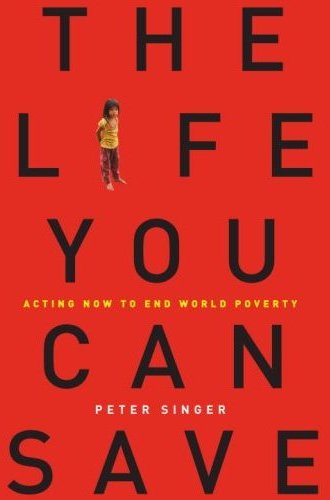
The Life You Can Save: Acting Now to End World Poverty
by Peter Singer
When philosopher Peter Singer says that billionaires’ owning giant yachts is as shamefully decadent as Roman emperors’ eating the brains and tongues of thousands of peacocks and flamingos, it’s hard to disagree. Mansions-on-the-sea like the one owned by Oracle’s Larry Ellison emit as much nitrogen oxide in an hour as a Jetta emits in 20 years. All the fuel they spend, Singer writes, “is being burned up not so that people can grow food, or get to work, or visit their loved ones, but so that Larry Ellison can amuse himself and show off how rich he is.”
When Singer says that buying a soda is a sign of needless spending, too, it’s a little harder to go along. But his slim, tightly-argued volume – the result of his years of advocating for more giving to the extremely poor – makes the case strongly. “If you are paying for something to drink when safe drinking water comes out of the tap,” he writes, “you have money to spend on things you don’t really need.” Same goes, of course, for the yachts.
Singer acknowledges that Americans already give a lot, albeit generally to religious and educational causes in our own comparatively well-off backyards. But they also have a lot of reasons for not giving more, and elsewhere, as Singer notes. Some common claims include that philanthropy undermines political change; that charity breeds dependency; that our economy needs the spare cash to grow; and that it’s hard to find an effective charity. He takes each of these reasons (and more) in turn, noting that Americans, generally, can provide for their families and friends and livelihoods first and still have enough left to give, and that as long as they give wisely, they can avoid some of the pitfalls of donating money.
Singer also takes on the question of whether it’s against human nature to give. Several impulses stop us from donating money to save the lives of children in Africa and Asia. There’s a reason that television ads for charities linger on images of malnourished kids: people are more likely to give to an identifiable person than they are to respond to statistics. But TV images can’t overcome more problematic parts of our nature – the belief, for instance, that our lone donation is futile, and that we shouldn’t bother if everyone else isn’t doing the same. Most pernicious of all, perhaps, is what Singer calls “the norm of self-interest,” the entrenched American belief that there is something deviant about caring or selfless behavior. Singer acknowledges these aspects of our nature, allowing that reason doesn’t always motivate our decisions. But he still seeks to overcome them by arguing for a “culture of giving,” one that would presumably make it seem more natural to give.
Crucial to building that culture is to convince would-be donors that not giving is wrong – this is the crux of Singer’s argument. Citing the moral traditions of most of the world’s major religions, and considering variations on the classic ethical dilemma of what to sacrifice to save a drowning child, Singer makes an argument that he admits has “radically demanding implications”: that if you can give money to alleviate suffering without sacrificing anything nearly as important in return, it is wrong not to give money.
But even Singer eases this ethical standard, to meet the ambitious stated goal of his book – to convince his readers to give money, at quite higher rates than they already might. He argues that anyone making over $100,000 or so should give 5% of his or her income, with the portion increasing as earnings rise. Wealthy Americans alone, following Singer’s admittedly still-high standard, would raise $471 billion in one year.
In the end, Singer returns to appeal to the very human nature he sought to overcome earlier in his text: “If you are persuaded by the moral argument, but are not sufficiently motivated to act accordingly, I recommend that instead of worrying about how much you would have to do in order to live a fully ethical life, you do something that is significantly more than you have been doing so far. Then see how that feels.”
Excerpt: We tend to assume that if people do not harm others, keep their promises, do not lie or cheat, support their children and their elderly parents, and perhaps contribute a little to needier members of their local community, they’ve done well. If we have money left over after meeting our needs and those of our dependents, we may spend it as we please. Giving to strangers, especially those beyond one’s community, may be good, but we don’t think of it as something we have to do. But…what many of us consider acceptable behavior must be viewed in a new, more ominous light. When we spend our surplus on concerts or fashionable shoes, on fine dining and good wines, or on holidays in faraway lands, we are doing something wrong.
Further Reading: The Bottom Billion: Why the Poorest Countries are Failing and What Can Be Done About It and Living High and Letting Die: Our Illusion of Innocence




Send A Letter To the Editors